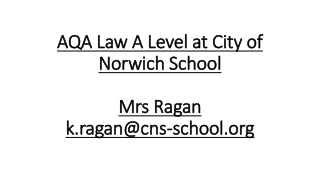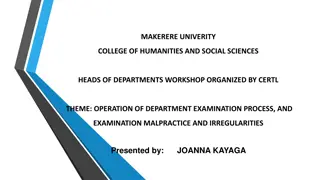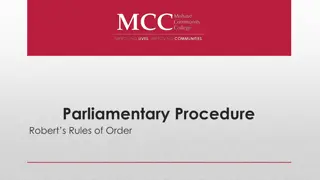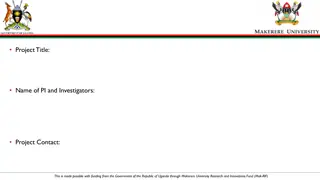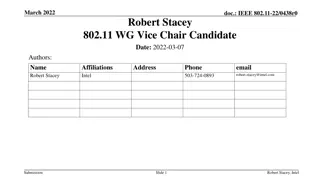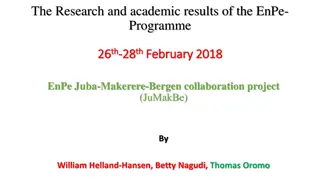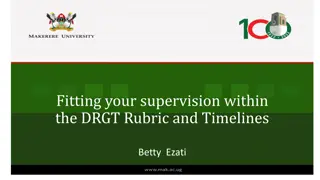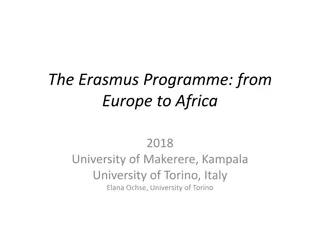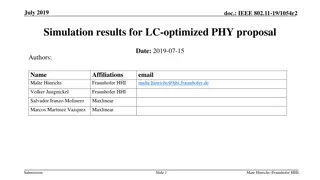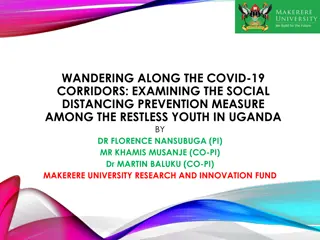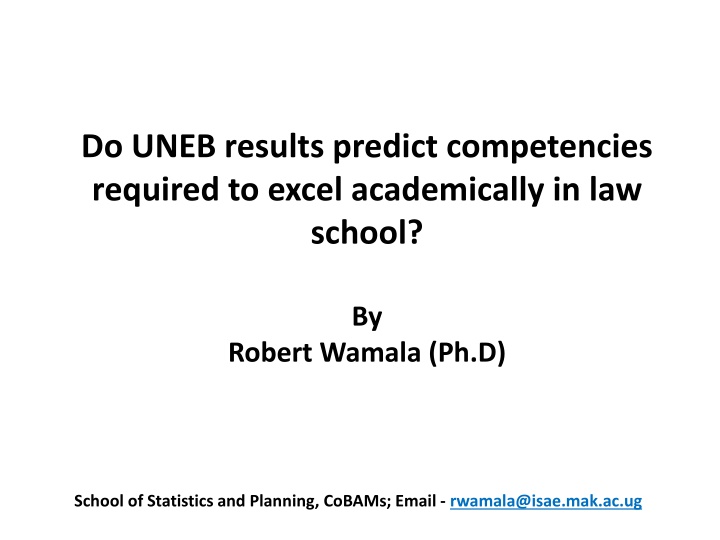
Excelling Academically in Law School: Competencies and Requirements
Learn about the importance of excelling academically in law school, as highlighted by research by Robert Wamala (Ph.D), and understand the competencies required for success in legal education. Discover the relevance of prior studies, guidelines from various institutions, and the evolving requirements for entry into law programs.
Download Presentation

Please find below an Image/Link to download the presentation.
The content on the website is provided AS IS for your information and personal use only. It may not be sold, licensed, or shared on other websites without obtaining consent from the author. If you encounter any issues during the download, it is possible that the publisher has removed the file from their server.
You are allowed to download the files provided on this website for personal or commercial use, subject to the condition that they are used lawfully. All files are the property of their respective owners.
The content on the website is provided AS IS for your information and personal use only. It may not be sold, licensed, or shared on other websites without obtaining consent from the author.
E N D
Presentation Transcript
Do UNEB results predict competencies required to excel academically in law school? By Robert Wamala (Ph.D) School of Statistics and Planning, CoBAMs; Email - rwamala@isae.mak.ac.ug
PRESS RELEASE: Pre-Entry Exams for LL.B Entrants The dean, school of law writes: There has been a mismatch between entry grades and the performance during the LL.B program and the legal profession (Makerere University, 2011, p.1) Students are admitted with triple or even quadruple As , which unfortunately is in many cases, not reflected in their performance in law school.
Relevance of prior studies There is overwhelming evidence in support of successful performance of enrollees who have excelled academically in the past. This evidence is supported by studies across: 1. Disciplines Accounting and business economics (Duff, 2004; Alan & Othman, 2005) Business management and national statistics (Halpern, 2007; Hoskins, Newstead & Denni, 1997) Nursing (Navarro, Vitamog, Tierra, & Gonzalez, 2011) and Actuarial Science (Wamala, 2013) 2. Education Levels Undergraduate (Alan & Othman, 2005 ; Halpern, 2007 ; Wamala et al, 2013) Graduate (e.g., Navarro et al., 2011; Gregory, 2004 )
Competencies for undertaking Law Institution University of Texas catalogue [2012/2014] Guidelines - Undergraduate Enrollees of law should be able to demonstrate proficiency in: communication - writing in English, critical proficiency in oral and graphic communication Conceptual approaches and history of arts ability to comprehend factual concepts and human creativity Political and economic dimensions of a society Cultural diversity including nature and limits of knowledge and academic fields. Alabama State Bar [Association of lawyers in the USA] Importance of enrollees grounding in the disciplines: Analytical writing, English and literature, Political science, Economics and accounting, History, philosophy, logic, scientific methods Public speaking
Competencies for undertaking Law [Cont.] Institution Guidelines John Hopkins University [The parent advising hand book] Competence in economics, history, political thoughts and mathematics provides a basis for building enrollees grounding regarding knowledge in resolving disputes. University of Canterbury Importance of language and writing competencies: Enrollees with science, mathematics, music or art background will only succeed in law school if they possess good language and writing skills Makerere University [Guidelines for all public Universities] There has been a shift in the requirements in recent past: Up until early 2000s, subjects namely History, literature and Divinity were considered essential Subsequently, any subjects done by enrollees in their A- Level were considered essential (MoES, 2005; 2006; 2007) From 2012 onwards, outcome of pre-entry tests are adopted as a basis for admission
Objective of the study To investigate the relevance of prior studies in predicting competencies required to excel academically in law school. Focus was made on A-Level grades obtained in disciplines, namely, History, Divinity, Literature, Economics and Geography. Data and Methods Administrative records of 629 graduates in the enrollment cohorts 2005 to 2007 over the four stipulated period of study were adopted [N = 2485] Academic achievement [dependent] was assessed by CGPA obtained in the first, second, third and fourth year of study Investigations were made by: grades obtained in the A-level subjects and/or weighted score; students characteristics namely, sex, cohort, entry scheme and Nationality
Characteristics of enrollees [2005-2007 Cohorts] Students Characteristics Overall Between N Percentage (%) N Percentage (%) Sex Female 1465 58.9 371 59.0 Male 1020 41.1 258 41.0 Total 2485 100.0 629 100.0 Year of Enrollment 2005 843 33.9 215 34.2 2006 887 35.7 225 35.8 2007 755 30.8 189 30.1 Total 2485 100.0 629 100.0 Nationality Non-Ugandan 224 9.0 58 9.2 Ugandan 2261 91.0 571 90.8 Total 2485 100.0 629 100.0 Entry Scheme Government 993 40.0 249 39.6 Private (Day) 1220 49.1 312 49.6 Private (Evening) 272 10.9 68 10.8 Total 2485 100.0 629 100.0
Weighted Score [on Admission] Table 4: Summary statistics of the combined weighted score N Mean Std. Dev Min Max 2023 51.8 3.04 44.1 56.5 Note. The maximum possible score is 60 Mean weighted score suggests that the enrollees were highly competent in undertaking a bachelor s study. The questionable aspect is the whether enrollees were competent for law school? With regards to subjects done at A-Level
Academic Achievement Table 1: Descriptive summary of academic achievement Year of Study Mean Std. Dev Min Max First 3.01 0.33 2.20 4.00 Second 3.04 0.31 2.23 4.05 Third 3.12 0.30 2.23 4.13 Fourth 3.19 0.29 2.30 4.30 Note. Estimates are based on CGPA A Lower second class of degree obtained by a considerable number of graduates on the program
Predictors of academic achievement Independent Variables Model 1 Model 11 Coef. Std. Err p-value Coef. Std. Err p-value Nationality Non Ugandans 1.000 . . 1.000 . . Ugandans -0.067 0.040 0.096 -0.094 0.059 0.113 Year of Enrollment 2005 1.000 . . 1.000 . . 2006 2007 -0.081 -0.089 0.028 0.028 0.004 0.001 -0.099 -0.158 0.033 0.031 0.003 0.000 Entry Scheme Government 1.000 . . 1.000 . . Private -evening Private-day -0.089 -0.055 0.038 0.042 0.018 0.198 -0.117 -0.083 0.055 0.049 0.033 0.097 Sex Female 1.000 . . 1.000 . . Male 0.001 0.024 0.696 0.041 0.026 0.112 Literature N/A 1.000 . . . . . A B C 0.101 0.058 0.030 -0.017 0.036 0.043 0.059 0.095 0.005 0.180 0.608 0.860 . . . . . . . . . . . . D++ Note. Assessment based on panel data approach Random Effects Model (RE) using MLE
Predictors of academic achievement [Cont.] Divinity Coef. 1.000 0.065 0.029 -0.062 -0.075 Std. Err . 0.029 0.036 0.058 0.159 p-value . 0.026 0.409 0.278 0.639 Coef. . . . . . Std. Err . . . . . p-value . . . . . N/A A B C D++ Economics N/A 1.000 -0.122 -0.252 -0.330 -0.317 . . . . . . . . . . . . . . . . . A B C 0.094 0.094 0.095 0.098 0.196 0.008 0.001 0.001 D++ Geography N/A 1.000 0.057 0.042 0.007 -0.068 . . . . . . . . . . . . . . . . . A B C 0.040 0.039 0.051 0.068 0.152 0.276 0.894 0.316 D++ History N/A 1.000 0.214 0.169 0.140 -0.092 . 3.220 . . . . . . . . . . . . . . . . . A B C 0.085 0.087 0.097 0.211 . 0.054 0.012 0.052 0.150 0.665 . 0.000 D++ Weighted Score constant 0.026 3.331 0.009 0.065 0.003 0.000 Note. Assessment based on panel data approach Random Effects Model (RE) using MLE
Summary of the Findings [Students characteristics] Significant variations in academic achievement (CGPA) were noted by enrollees characteristics namely,nationality, enrollment cohort, and entry scheme (p < 0.05). 1. Students on government entry scheme had a higher CGPA compared to those on the private evening arrangement 2. Enrollees in the 2006 and 2007 cohorts had a lower CGPA compared to those in 2005 Could it be that students in the recent cohorts are increasingly taking on A-Level subjects they can easily pass rather than those they require to excel academically in law school ?
Summary of the Findings [A Level subjects] Significant variations in academic achievement were noted by performance in disciplines namely literature, divinity, economics and history (p < 0.05). 1. Students who obtained grade A in literature had higher CGPA compared to their counterparts who did not take the subject at A-Level 2. Students who obtained grade A in divinity had higher CGPA compared to their counterparts who did not take the subject at A-Level 3. Students who obtained grades A and B in history had a higher CGPA compared to those who did not take the subject at A-Level 4. Students who obtained grade B and below in economics had a lower CGPA compared to those who did not take the subject at A-Level
Summary of the Findings [Weighted score] Significant variation in academic achievement was noted by the weighted score adopted on admission to law school(p < 0.01). Fractional Polynomial (1), adjusted for covariates 4.5 Partial predictor+residual of cgpa 4 3.5 3 2.5 45 50 55 60 weight Line of best fit is not steep enough weighted score weakly predicts CGPA
Implications Performance in A-level subjects namely History, Divinity and Literature predicts competencies required to excel academically in law school Questionable aspects 1. Using ANY best done of all A-Level subjects as Essential subjects (MoES, 2005; 2006; 2007) to determine competence of candidates to law school 2. The most competent candidates are the ones with the highest weighted score adopted on admission to law school (MoES, 2005; 2006; 2007) Is the issue A-Level results or guidelines adopted on admission to law school ?
What about the pre-entry test to law school ? Is performance in the test predicted by grades obtained in History, Divinity and Divinity ?
Enrollees admitted on the basis of the test [2012-2013 Cohort] Students characteristics Gender N Percentage (%) Female Male Total 253 562 815 31.0 69.0 100.0 Enrollment cohort 2012 2013 Total 461 354 815 56.6 43.4 100.0 Nationality Non-Ugandan Ugandan 17 798 815 2.1 97.9 100.0 Total Entry scheme Government Private (Day) Private (Evening) 156 511 148 815 19.1 62.7 18.2 100.0 Total Prior qualification a A-Level 612 102 101 815 75.1 12.5 12.4 100.0 Bachelors degree Others Total
Enrollees admitted on the basis of the test [Grades Obtained] A-Level subjects Literature N Percentage (%) N/Aa 504 99 140 63 9 815 61.8 12.2 17.2 7.7 1.1 100.0 A B C D+ Total Divinity N/A 378 130 158 99 50 815 46.4 16.0 19.4 12.2 6.1 100.0 A B C D+ Total Economics N/A 230 77 148 172 188 815 28.2 9.5 18.2 21.1 23.1 100.0 A B C D+ Total Note. N/A denotes student who did not do a subject at A-Level
Enrollees admitted on the basis of the test [Grades Obtained] Geography N Percentage (%) N/A 610 74.9 A 51 6.3 B 73 9.0 C 59 7.2 D+ 22 2.7 Total 815 100.0 History N/A 238 29.2 A 112 13.7 B 333 40.9 C 112 13.7 D+ 20 2.5 Total 815 100.0 Contrary to enrollees admitted on the basis of their performance in A-Level, the highest proportion of students obtained Grade B in the subjects.
Performance in the Test Table 3: Descriptive summary of performance in the test Enrollment cohort N Mean (95% CI) Min Max 2012 446 59.2(58.6 - 59.8) 50 83 2013 348 67.1(66.4 - 67.8) 50 89 Academic Achievement Table 4: Descriptive summary of academic achievement [2012 Cohort] Year of Study N Mean (95% CI) Min Max First 379 2.65 (2.59 2.69) 0.60 3.90 Note. Estimates are based on First Year CGPA Figure is lower than FYCGPA of enrollees admitted using grades obtained in A-Level Combination of admission test and Undergraduate GPA predicts first-year GPA in law school (Anthony, Harris & Pashley 1999; Dalessandro, Stilwell, & Reese 2005; Evans, 1984; Norton, Suto, & Reese, 2006; Wightman 1993)
Predictors of performance in the Test Model I a Std. Err Model II b Std. Err Independent variables Coef. p-value Coef. p-value Gender Male Female 0.00 -1.09 . . 0.00 -1.24 . . 0.204 0.000 0.666 0.062 Enrollment cohort 2012 2013 0.00 7.72 . . . . . . . . 0.206 0.000 Nationality Non Ugandans Ugandans 0.00 5.18 . . 0.00 2.28 . . 0.963 0.000 2.667 0.291 Entry Scheme Government Private -evening Private-day 0.00 -10.00 -5.27 . . 0.00 -10.36 -4.59 . . 0.244 0.294 0.000 0.000 0.859 1.044 0.000 0.000 Prior qualification 0.00 3.36 -3.90 . . 0.00 -1.03 -5.49 . . A-Level 0.835 0.840 0.000 0.000 2.040 2.035 0.612 0.007 Bachelors degree Others Literature A B C 0.00 -0.18 0.54 -0.72 -0.27 . . 0.00 -0.24 0.40 -1.63 -0.54 . . 0.482 0.607 1.243 0.499 0.585 0.197 0.401 0.431 1.129 1.331 2.246 1.225 0.826 0.760 0.467 0.657 D++ N/Ac Note. Assessment is based on a quantile (median) regression
Predictors of performance in the Test [Cont.] Divinity Coef. 0.00 0.09 -0.36 0.18 0.90 Std. Err . 0.308 0.365 0.450 0.329 p-value . 0.768 0.321 0.687 0.006 Coef. 0.00 0.39 -0.11 0.24 0.54 Std. Err . 0.873 1.188 2.121 0.997 p-value . 0.649 0.920 0.909 0.582 A B C D++ N/A Economics A B C 0.00 -1.45 -1.36 -1.27 -1.18 . . 0.00 -2.11 -2.01 -1.91 -2.76 . . 0.353 0.354 0.368 0.690 0.000 0.000 0.001 0.088 1.144 1.171 1.258 2.281 0.066 0.086 0.130 0.226 D++ N/A Geography A B C 0.00 0.18 0.18 0.27 1.09 . . 0.00 0.95 0.78 1.42 0.75 . . 0.462 0.500 0.642 0.418 0.694 0.717 0.671 0.009 1.769 1.812 2.159 1.616 0.589 0.666 0.510 0.640 D++ N/A History A B C 0.00 -0.54 -1.09 1.00 -0.63 . 61.90 . . 0.00 -1.65 -2.05 0.49 3.50 0.70 66.15 . . 0.287 0.362 0.630 0.600 . 0.919 0.058 0.003 0.113 0.290 . 0.000 1.284 1.415 1.962 2.649 0.522 3.000 0.199 0.148 0.799 0.186 0.180 0.000 D++ N/A FYGPA Constant
Summary of the Findings [Characteristics] Performance in the test was HIGHER among: 1. Males (p < 0.01) 2. Ugandan nationals (p < 0.01) 3. Bachelor s degree holders at enrollment compared to those with A-Level (p < 0.01) Performance in the test was LOWER among: 1. Privately sponsored day and evening students compared to government scheme (p < 0.01) 2. Students admitted on the basis of diploma and mature entry compared to those with A-Level (p<0.01).
Summary of the Findings [A-Level Subjects] Performance in the test was HIGHER among: 1. Enrollees who did not do Literature compared to those with grade A (p < 0.05). 2. Enrollees who did not do Geography compared to those with grade A (p < 0.05). 3. Enrollees who obtained grade A in Economics compared to other grades (p < 0.01) Performance in the Test was LOWER among: 1. Enrollees who obtained grade C in history compared to those with grade A (p < 0.01). Grades obtained in History, Divinity and Literature do not predict performance in the pre-entry test.
Implications Aptitude tests predict inherent mental rather than educational or academic ability as applied to law (LNAT Consortium, 2010; Law School Admission Council, 2013; 2001) Questionable aspects 1. Relying heavily on the outcome of the test to admit students under the government entry scheme (Makerere University, 2011) 2. Relying heavily on the outcome of the test to admit students to law school Although candidates for the test are determined by a pooled index of attainment in A-Level (any subjects), admission to law school is mainly determined by the outcome of the test
Conclusions 1. The outcome of the admission test does not predict competencies required to excel academically in law school 2. Performance in A-Levels subjects namely, History, Divinity and Literature predicts competencies required to excel academically in law school A pooled index of attainment in prior studies - using ANY subjects done at A-level - should not be used as a basis for determining candidates to sit the pre-entry test
Recommendations 1. To obtain the most academically competent candidates to law school, admission requirements should focus on performance in the A-Level subjects namely History, Divinity and Literature 2. Requirements to sit the admission test should be based on performance in the subjects rather than a pooled index of attainment in prior studies i.e. A-Level
Problem is NOT UNEB results but the guidelines for admission to law school

